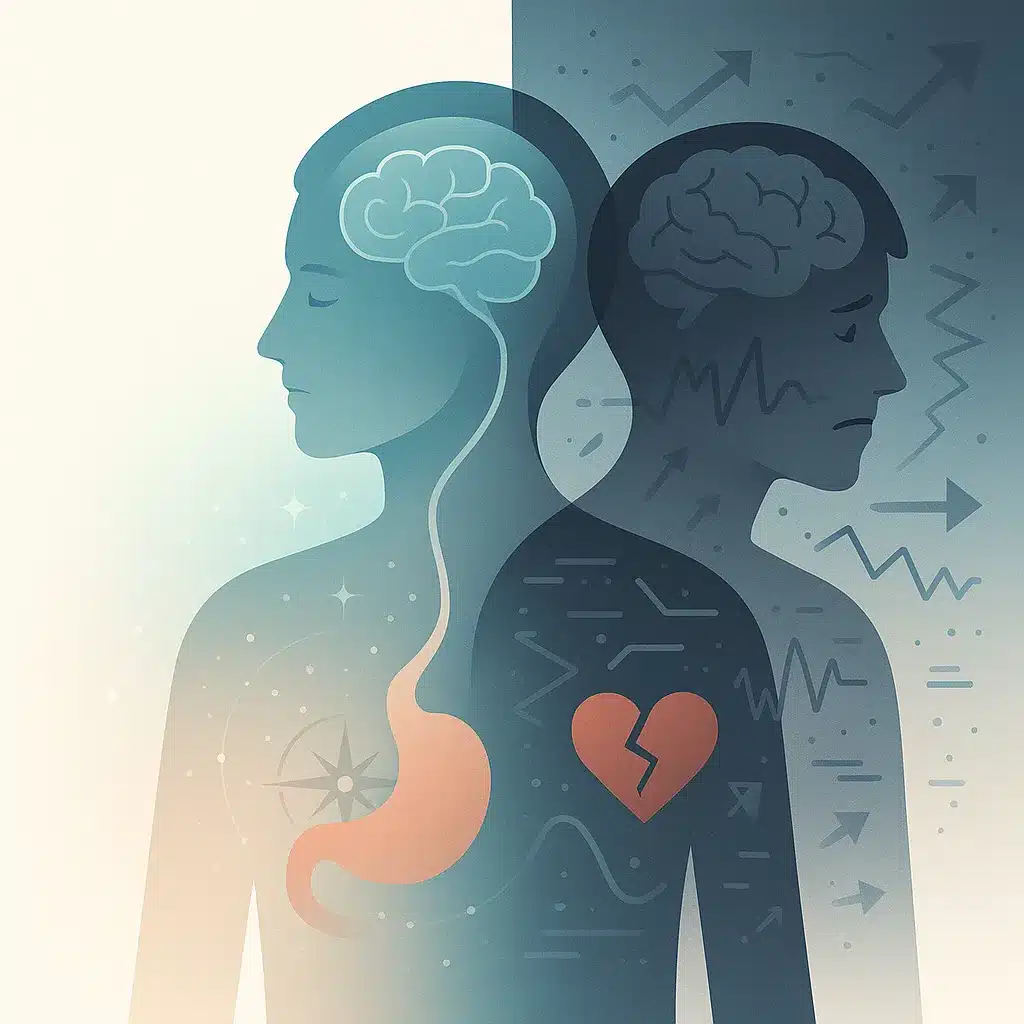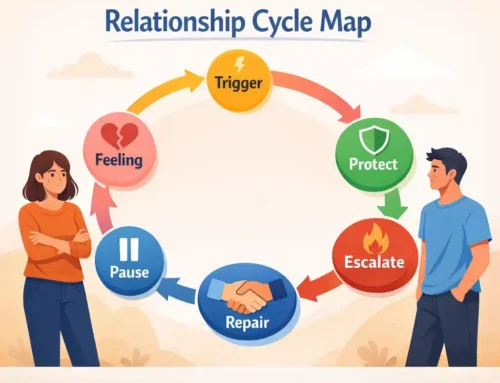
Approx. read time: 7.8 min.
Post: Swoon Over Gut Feelings: 5 Intuition Vs Anxiety
🔍 What Are Gut Feelings?
Gut feelings are those quick, confident impressions that pop up before you can explain them. They feel like a knowing in your body—often a subtle “yes/no” signal. In everyday life, gut feelings help you read people, spot opportunities, and steer away from risks. They draw on patterns you’ve learned over years of experience, even if you can’t put those patterns into words.
Crucially, gut feelings are not magic. They’re fast, experience-based judgments your brain generates below conscious awareness. Sometimes they’re spot-on. Other times, especially under stress, they can go off course. The art is learning when to lean on them and how to pair them with clear reasoning.
🧠 Intuition vs. Insight: They’re Cousins, Not Twins
Researchers distinguish between two forms of non-analytical thinking:
-
Intuition: a gradual, experience-driven sense that you’re on the right track.
-
Insight: the sudden “aha!” when the answer snaps into focus.
Both can lead to good decisions, but they work differently. Decades of cognitive science and neuroscience show intuition tends to build quietly from learned patterns, while insight arrives as a discontinuous leap after your brain restructures the problem. PMC+1
🧩 The “Cheese” Puzzle: How Pattern Sensing Works
Consider the word trio cottage – swiss – cake. They seem unrelated until your mind clicks on the hidden link: cheese. Tasks like these (often called Remote Associates problems) let scientists watch whether people feel they’re getting warm (intuition) or suddenly see the answer (insight). Studies find the two routes are real and dissociable in the lab, aligning with different cognitive dynamics. PMC+2PMC+2
😰 How Anxiety Disrupts Gut Feelings
“Trust your gut” isn’t always wise when you’re keyed up. In experiments that induced anxiety, participants got worse at intuitive tasks than neutral or positive-mood groups. The anxious state—not just an anxious personality—blocked people’s ability to detect subtle patterns. In other words, when anxiety is high, your “gut” gets noisy and unreliable. SAGE Journals
Why it matters: If a decision feels urgent, jittery, or fear-driven, you may be hearing anxiety, not intuition. Calm the system first; then reassess.
🧭 Intuition vs Anxiety: A Quick Spotting Guide
-
Speed & clarity
-
Intuition: quick and clear; a quiet “this fits.”
-
Anxiety: fast but foggy; racing “what-ifs” without resolution.
-
-
Body cues
-
Intuition: subtle alignment; relaxed breath or gentle nudge.
-
Anxiety: tight chest, sweaty palms, jittery stomach, restlessness.
-
-
Emotional tone
-
Intuition: neutral, matter-of-fact confidence.
-
Anxiety: fear, dread, urgency to escape discomfort.
-
-
Focus of thoughts
-
Intuition: solution-oriented; eyes on the next right move.
-
Anxiety: loops of worst-case scenarios and rumination.
-
-
Effort
-
Intuition: feels effortless.
-
Anxiety: feels effortful and exhausting.
-
If three or more “anxiety” signs show up, pause. Re-center before you decide.
🎯 Why People Prefer Gut Choices in Identity Decisions
Across five preregistered experiments, people were more likely to rely on intuition when authenticity mattered—for example in romance, creativity, or values-laden choices. Intuitive decisions were seen as more “true to self,” while deliberative choices felt more calculated. The preference for gut feelings increased when authenticity was made salient. ScienceDirect+1
Takeaway: In domains tied to identity and meaning, intuition can carry legitimate weight. In technical domains (finance, engineering, safety), prioritize analysis and checks.
💡 High-Value Decisions Can Feel Easier Than You Think
Surprisingly, evidence shows people are faster and more accurate when choosing between two high-value options. When stakes are truly high but options are both good, your brain can process value efficiently, reducing felt difficulty. This challenges the idea that big decisions must always be slow and agonizing. PubMed+2IDEAS/RePEc+2
What to do: If a high-value choice feels oddly clear, don’t dismiss it. Validate it with a quick reasoned check—then move.
🧰 A 3-Step Framework: Integrate Gut + Reason
-
De-noise (State First):
Two minutes of slow breathing (inhale 4, exhale 6) or a brief walk. This lowers arousal so intuition can actually work. -
Dual Pass (Signal + Checks):
-
Pass A (Intuition): What does your gut say in one sentence?
-
Pass B (Reason): List 3 facts that support or contradict it.
-
-
Converge (Action):
If gut and facts align, decide. If they diverge, define a quick test (email, prototype, expert call) to gather one decisive data point within 24 hours.
🧘 Mini Exercises to Clear the Noise
-
90-Second Body Scan: Sweep attention from head to toe; label any tension “tight / warm / flutter.” Let it be. Clarity often follows.
-
If–Then Reframe: “If I feel urgent + foggy, then I slow my breath for 2 minutes.”
-
Future You Test: Ask, “What would ‘me in 12 months’ thank me for?” Note the first calm answer.
These practices reduce state anxiety so intuition can function closer to baseline. That’s consistent with lab findings showing anxiety impairs intuitive pattern detection. SAGE Journals
🔒 Common Biases That Masquerade as Gut Feelings
-
Availability bias: Recent dramatic events feel predictive.
-
Confirmation bias: You selectively notice facts that fit your hunch.
-
Halo/horns effects: One trait dominates your whole impression.
-
Sunk-cost fallacy: Past investment feels like a “signal” to continue.
-
Social proof: Group vibes feel like “intuition” but reflect conformity.
Fix: Name the bias out loud, then write one disconfirming fact.
📋 A 5-Minute Decision Checklist
-
State: Am I calm enough to trust gut signals? (If not, de-noise first.)
-
Fit: Is this domain identity/values (intuition-weighted) or technical/regulated (analysis-weighted)? ScienceDirect
-
Signal: What does my gut say in one line?
-
Evidence: Top 3 facts for/against.
-
Risk Guardrails: Worst reasonable downside + how I cap it.
-
Next Step: Decide or set a fast test to resolve uncertainty.
🧪 When to Trust Gut Feelings—And When to Slow Down
Trust more when:
-
You have domain experience (years of reps, feedback loops).
-
The environment is stable (patterns repeat).
-
You feel calm clarity, not urgency or dread.
Slow down when:
-
You’re anxious, sleep-deprived, or time-pressured. SAGE Journals
-
The decision is novel, high-risk, or highly technical.
-
There are conflicts of interest or strong social pressure.
🧭 Practical Scripts
-
Career move: “My gut says Option A. Facts that support it: growth, manager fit, pay. One disconfirming fact: commute. I’ll test by shadowing the team for two hours.”
-
Relationship: “I feel ease and respect with them. To check myself, I’ll ask two trusted friends for observations and sleep on it once.”
-
Money choice: “Strong hunch to invest, but this is a technical domain. I’ll require a written thesis, expected value, and an external expert check.”
❓ FAQs
Q1. Are gut feelings real or just bias?
They’re real signals from fast, pattern-based processing—useful and fallible. Pair them with quick evidence checks.
Q2. How do I tell intuition from fear?
Intuition is calm and clear; fear feels urgent and noisy. If you can’t get calm, you can’t trust the gut—de-noise first.
Q3. Does experience make intuition better?
Yes. Repeated reps with feedback sharpen pattern recognition. In new domains, lean more on analysis and mentorship.
Q4. Can anxiety permanently damage intuition?
The research points to state anxiety disrupting intuitive performance in the moment; reduce arousal and intuition rebounds. SAGE Journals
Q5. Should I use intuition in creative work?
Absolutely—especially for ideas and taste calls—then validate with small tests. Insight and intuition often co-operate. PMC
Q6. Why do big personal choices feel “truer” when decided by gut?
People associate authenticity with intuition in identity-relevant decisions. That’s why gut-based choices can feel more “me.” ScienceDirect
Q7. Are high-stakes decisions always harder?
Not necessarily. Between two good options, choices can be faster and more accurate than expected. PubMed
Q8. What’s a safe way to act on a gut feeling?
Set guardrails: cap downside, run a quick test, or get one expert opinion before fully committing.
Q9. Is a “gut feeling” literally from the gut?
The enteric nervous system and interoception influence emotions, but the decision signal originates from brain pattern processing that integrates body cues.
Q10. Can I train better gut feelings?
Yes: get reps with feedback, journal decisions and outcomes, reduce chronic stress, and practice brief mindfulness to improve signal-to-noise.
🚀 Final Takeaway
Gut feelings are powerful when you’re calm, experienced, and facing identity-relevant choices. They’re weaker under anxiety, novelty, and high technical risk. The best decisions integrate intuition + evidence with simple guardrails.
📚 Sources & References
-
Zander, T., et al. “Intuition and Insight: Two Processes That Build on Each Other…” Frontiers in Psychology (2016). PMC
-
Zhang, Z., et al. “Approaching the Distinction between Intuition and Insight.” Frontiers in Psychology (2016). PMC
-
Remmers, C., & Michalak, J. “Why You Don’t See the Forest for the Trees When You Are Anxious: Anxiety Impairs Intuitive Decision Making.” Clinical Psychological Science (2018). SAGE Journals
-
Oktar, K., & Lombrozo, T. “Deciding to be authentic: Intuition is favored over deliberation when authenticity matters.” Cognition (2022). ScienceDirect+1
-
Shevlin, B.R.K., Smith, S.M., Hausfeld, J., & Krajbich, I. “High-value decisions are fast and accurate…” PNAS (2022). PubMed+1
-
(Context) Travers, M. “A Psychologist Explains The Surprising Truth About ‘Gut Feelings’.” Forbes (Sept 11, 2025). Forbes










